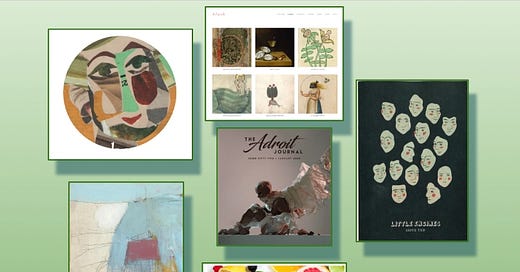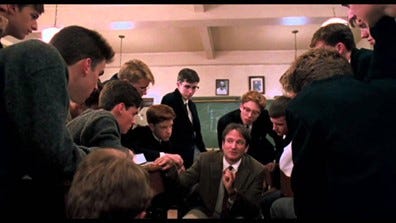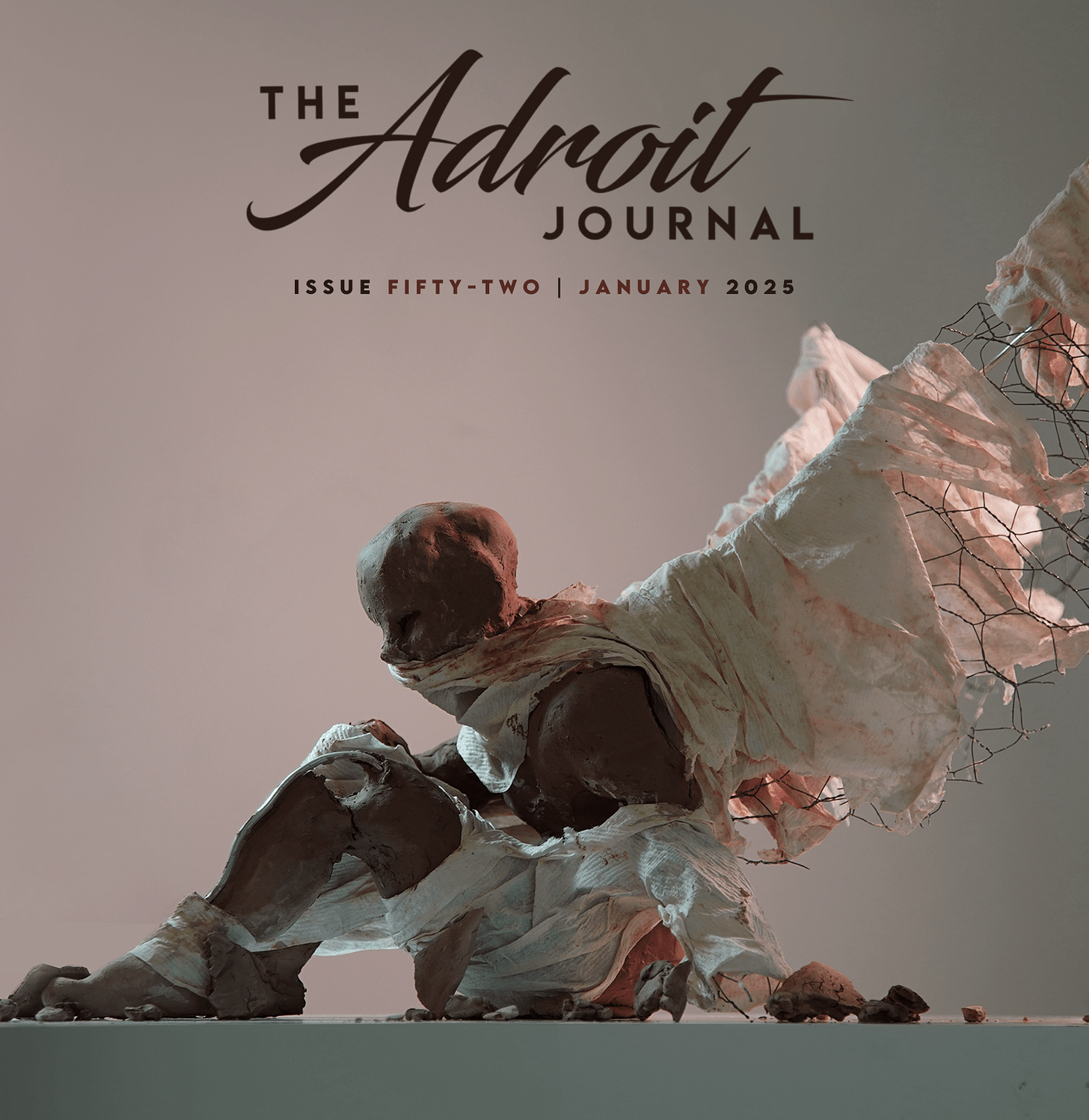Who Reads Lit Mags? We Do! Spotlight on Little Engines, Waxwing, Blush, Adroit Journal, Citron Review, Epiphany
"...we can step away from our screens and look inward to find our verse."
Welcome to our weekly column offering perspectives on lit mag publishing, with contributions from readers, writers and editors around the world.
Hi, all. Jessica here. It’s the first Thursday of the month, which means we all get to share what we’ve been reading in lit mags!
As always, I’ve been keeping a list of all works mentioned in this series, including works shared in the comments section, which you can find right here.
This month, I’m focusing on poetry. I keep thinking about Robin Williams’ character, John Keating, in Dead Poets Society, telling his students to rip out the introductory pages of their poetry books. “We don’t read poetry because it’s cute,” says the English teacher. “We read and write poetry because we are members of the human race. And the human race is filled with passion. Medicine, law, business, engineering…these are noble pursuits and necessary to sustain life. But poetry, beauty, romance, love, these are what we stay alive for.”
I am not usually someone who enjoys remakes. Even though I am a big fan of Tim Burton, I have never seen his version of Charlie and the Chocolate Factory, because Gene Wilder is seriously the GOAT and why mess with perfection? But. Even though Dead Poets Society is a masterpiece, I sincerely believe that we need a modern day reimagining that reflects what we are facing right now (which is a lot!) and inspires us to connect by writing and reading poetry. What we’re facing today isn’t just the pressures of conformity and getting stuck in the grind, it’s the risk of losing our humanity to automation, algorithms, and AI crap. And maybe the only way to change that is by having a teacher put a hand over our eyes so we can step away from our screens and look inward to find our verse.
Speaking of stepping away from screens, the first lit mag I’m excited to talk about is print magazine . I actually discovered it at the library where I work because if you send in a request, the editors will mail you a bunch of copies to distribute as you please. How neat is that? There is something about this lit mag that is effortlessly cool.
Adam Voith, Editor, Publisher, and Founder of Little Engines, feels like that friend you had in high school that paid a lot of attention to good music, so that every time you stepped into his car, you knew you were going to listen to something interesting and worth your time. The magazine is lightweight, printed on newspaper stock and the art and stories have so much heart and yet they feel punk rock at the same time. Some issues come with stickers, while others include thick cardstock prints of featured artwork, ready to hang on your wall.
Their latest issue, No. 10, includes a poem called “Could’ve or Should’ve.” It’s about grief and memory. It is written like a letter, addressed to someone and signed off at the end, except the names have been redacted. My brain did little flips as I read it. The poem explores the act of burying, literally in the garden, and metaphorically in the narrator’s mind. The narrator is forgetting this person, yet they are not forgotten because they are the subject of the poem. But then, without their name, they are forgotten after all. It is actually a short poem, but there is so much feeling in it, so many contradictions. A sense of playfulness, but also aggression. A sense of letting go, a sense of holding on. The poem balances between light and heavy, making it both tender and unsettling at once.
And then I did a little shriek. In the library. The poet was Justin Vernon. Of Bon Iver.
Maybe you have never heard of Bon Iver, but for a time, they were my entire personality. Once, while searching for a roommate on Craigslist, the only thing I wrote in my introduction was this: Hi, my name is Jess, and my favorite band at the moment is Bon Iver. That was all they needed to know.
Did Justin Vernon go through the regular submission process? Did Adam Voith solicit him? I want to know the details. At the same time, I don’t. I love imagining Vernon composing a submission email like the rest of us, feeling a little pukey after hitting send, a little proud that he actually did it, wondering what kind of response he will get, and trying to shrug off the possibility of rejection while keeping a sliver of hope alive.
One poet who always feels like a rockstar to me is Todd Dillard. I had to leave Twitter when it got x’d, and he’s one of the reasons I miss it, because that’s how I always found out when he had published a new poem. So, I went to his website to see what he’d been up to and was delighted to find him in Waxwing. His poem “No Rush” really hit me hard, especially, especially, especially the ending. I am tempted to include the last few lines here, but the whole thing fits so beautifully together I didn’t want to break it apart. The poem reminded me why I love his work: Dillard has this incredible ability to pull readers in completely, in a way that feels both vulnerable and universal at the same time.
There is something about Waxwing that makes poetry feel like an open-armed invitation. Chill Subs categorizes it as “top-tiered stuff. Not Paris Review but ok.” Its website is clean and professional-looking, and easy to navigate. I first discovered the journal when I was obsessed with another rockstar writer, Ross Gay, author of The Book of Delights. He published Catalog of Unabashed Gratitude in Waxwing, a poem that has everything in it, including some of the sexiest lines of poetry I have ever read. It is a long poem (which he even acknowledges toward the end) that brims with joy and generosity, even thanking the reader for sticking with him:
"…you, again you, for hanging tight, dear friend.
I know I can be long-winded sometimes."
You know what I love about sexy poetry? It jolts me awake, snapping me back into the present. It reminds me that I have an animal body. I’m not just a grown-up person with responsibilities, covering myself every morning for work, layering on clothes like dropping down the blackout curtains. A bra to hide my nipples. An undershirt to smooth over the softness of my belly. To keep my pants up, a belt. Then off to work, where I make lists, try not to stress about layoffs, schedule appointments, attempt to budget, and eat something responsible when what I really want is a Pop-Tart.
As much as I love print magazines for pulling me away from screens, sometimes I appreciate the immediacy of finding a sexy poem online. It looks so innocuous…just words on a screen. Of course, words are safe at work. It’s just a poem, right? Except my grip tightens around my phone as I take in the lines. But maybe people will think I am just reading some terrifying news article about the state of the world. Right? Except I’m also blushing.
The next magazine I want to talk about is Blush. It describes itself as promoting “decadent, forward-thinking texts authored from the bleeding edge,” and decadent is the perfect word—sensual without being reductive.
One poet I discovered through Blush is Rachel Rabbit White (do you think she chose Rabbit because of the vibrator? Or is that just me?). Rachel Rabbit White, a self-identified sex worker, writes about sex in a way that is bold, uninhibited, and just makes the reader feel alive.
In her poem Swan, she writes:
We say never apart
but they part
I take your legs
and find work
as an atmosphere model
An atmosphere model?! That just completely took over my brain as if Rachel Rabbit White wrote with a paintbrush. Also, I never considered swan a sexy word, but now I can’t stop thinking about how your mouth has to shape itself around it. And oh my gatos, isn’t it fun to just say Swan, as loud as you can, and just have that be everything you need to do, if only for just a long second?
The next lit mag I’m spotlighting is The Adroit Journal, a lit mag where new voices and established names co-exist in a way that feels like a true reflection of what’s happening in poetry today.
One poem I particularly love is a sonnet by Diane Seuss, “I Should Have Been in Cinema. I Should Have Been in Paint,” which is accompanied by a recording of Seuss reading the poem. I’m drawn to its magical, childlike quality, but what captivates me is how Seuss truly makes me feel like she took me somewhere, and at the end we are both shimmering. Also, this line is just a banger: I am big but this feeling is bigger, the silo whispered.
Another knock-out poem from Adroit Journal is from Issue Twenty-Six called, “There Is So Much Pressure in a White Dress” by Melissa Lozada-Oliva. I love how the poem delivers lines that make “poetic sense,” in that they don’t follow logic, yet you understand them on a visceral level. Like this line:
I listened to ‘Heaven Knows I’m Miserable Now’ & it got stuck
in the zipper. I hopped up & down & it didn’t come off.
The poem takes something as simple as a white dress, universally understood as off-limits except when you wear it to your own wedding, and pushes it to the edge, turning it into a symbol of defiance, and a letting go of all the ways and just saying fuck it. But instead of offering freedom, the dress is too tight, too constricting—you can sense that tension right from the title. It plays with societal expectations, the weight of tradition, and how, even when you try to let go and enjoy yourself, you still can’t escape the discomfort.
The Citron Review has been around since 2009, but it’s a new-to-me lit mag that I am thoroughly enjoying, especially because its website features colorful fruit that make me inexplicably happy even during these strange, turbulent times.
One poem I am excited to share is “Little Fires in the Body” by Melissa Eleftherion. Maybe it was because of the The Citron Review’s fruit imagery, but I couldn’t help but feel like this poem was like eating something delicious, especially because of the way the words formed in my mouth as I read them out loud.
Lastly, Epiphany consistently puts out thought-provoking and beautifully crafted work.
Although I could only access Epiphany online, this literary magazine is available in both digital and print formats. One poem that stood out to me was “Hold-Out Kitchen” by Turi Sioson, which I found particularly compelling for its spatial arrangement on the page. There’s a passage I keep returning to:
backlash. find me
holding your hand
under tables with green fire
What captivates me most is the gap before find me; it’s a pause that feels weighty, almost like a held breath. Some poems seem destined to be performed, while the intimacy of others is on the page, where the connection between writer and reader is quiet, yet electric. Dare I say its romantic in the way this poem invites the reader into its space. The speaker asks to be found, and once they are, they’re already holding your hand. And then there is the surprising moment of a green fire, a burning that defies the ordinary.
I am excited to hear about what you’ve been reading in lit mags lately. Have you been reading poetry lately too?
Like last time, please note that, while I look forward to reading our Lit Mag Brags each month and seeing what and where everyone has been published, I’d like this to be a resource for what we’re reading, not what we’ve written.
I can’t wait to see what everyone suggests.













Thanks for the Epiphany shoutout! We are putting the finishing touches on the next issue this week. It will be a banger!
Loved that this piece exuded such a compelling passion for poetry!